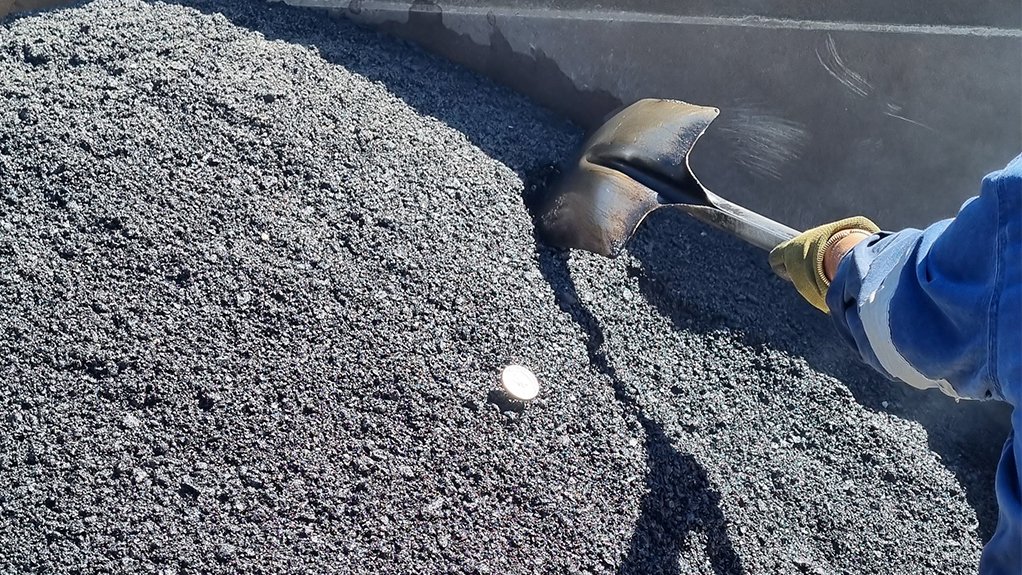Taking oil out of bitumen



INSTANT BIO-BITUMEN ASPHALT Asphalt manufacturers currently rely on imported bitumen
GREENER ALTERNATIVE Bio-bitumen dramatically reduces the safety, health and environment associated with traditional bitumen
Instant Bio-Bitumen, a carbon-negative alternative to conventional bitumen derived from the refining of crude oil for use as the binder in asphalt products, is currently being tested by asphalt producer AECI Much Asphalt.
The testing forms part of the local asphalt industry’s work towards reducing its carbon footprint and improving sustainability by using waste materials to produce road surfaces that last longer.
Instant Bio-Bitumen combines asphaltenes extracted from naturally occurring hydrocarbon resins with a maltene component derived from waste cashew nut shells. It can be produced by blending the ingredients or introducing them individually during the asphalt manufacturing process.
The bio-bitumen dramatically reduces the safety, health, environment and quality risks associated with traditional bitumen derived from crude oil. Further, it reduces total carbon dioxide emissions in asphalt production, and provides a convenient solution for asphalt production in remote locations.
International bitumen supply has been negatively impacted on by shipping regulation agency International Maritime Organisation’s 2020 regulations, which limit sulphur in fuel oil for ships to 0.50% for marine fuels globally, as well as the international move to green energy, explains AECI Much Asphalt plant and technical director Herman Marais.
“In South Africa, the closing down of refineries and limited capacity of those that remain means that asphalt manufacturers must import most of their bitumen requirements,” he notes.
“We need new solutions, and the development of alternative binders for flexible pavements that decrease impact on the environment is a significant breakthrough.”
AECI Much Asphalt bitumen technical manager Morne Labuschagne adds that several bio-bitumen products containing few to no petrochemical-derived materials are commercially available internationally.
“We decided to investigate Instant Bio-Bitumen for use in South Africa [owing] to its novel recipe and recent success in Europe,” he says.
A study at AECI Much Asphalt’s central laboratory in Cape Town in 2022 compared the properties of a traditional asphalt mixture manufactured with 50/70 penetration grade bitumen from a local refinery and an asphalt mixture using Instant Bio-Bitumen.
According to Labuschagne, the results showed that the properties of the traditional asphalt mixture using the wet blend process were similar but generally inferior to the dry blended asphalt mixture using Instant Bio-Bitumen.
In February, a plant trial was conducted at AECI Much Asphalt’s Contermankloof site in the Western Cape but not evaluated in detail, owing to lower-than-expected binder content.
A second trial is planned, with the asphalt mixture to be donated to a primary school for repairs and maintenance to parking areas, walkways and access roads.
“We are planning more paving trials on higher volume roads in the Western Cape. We are also conducting more research using aggregates from different sources and Instant Bio-Bitumen with various asphaltene/maltene ratios. The incorporation of Instant Bio-Bitumen in warm mix asphalt with high ratios of reclaimed asphalt is the next step in our investigations,” says Labuschagne.
AECI Much Asphalt continues to explore alternative sustainable recycling streams for various other waste materials such as foundry sand, waste shock tube generated by the explosives industry, sulphur by-products and filter cake generated during mineral oil recycling.
Comments
Press Office
Announcements
What's On
Subscribe to improve your user experience...
Option 1 (equivalent of R125 a month):
Receive a weekly copy of Creamer Media's Engineering News & Mining Weekly magazine
(print copy for those in South Africa and e-magazine for those outside of South Africa)
Receive daily email newsletters
Access to full search results
Access archive of magazine back copies
Access to Projects in Progress
Access to ONE Research Report of your choice in PDF format
Option 2 (equivalent of R375 a month):
All benefits from Option 1
PLUS
Access to Creamer Media's Research Channel Africa for ALL Research Reports, in PDF format, on various industrial and mining sectors
including Electricity; Water; Energy Transition; Hydrogen; Roads, Rail and Ports; Coal; Gold; Platinum; Battery Metals; etc.
Already a subscriber?
Forgotten your password?
Receive weekly copy of Creamer Media's Engineering News & Mining Weekly magazine (print copy for those in South Africa and e-magazine for those outside of South Africa)
➕
Recieve daily email newsletters
➕
Access to full search results
➕
Access archive of magazine back copies
➕
Access to Projects in Progress
➕
Access to ONE Research Report of your choice in PDF format
RESEARCH CHANNEL AFRICA
R4500 (equivalent of R375 a month)
SUBSCRIBEAll benefits from Option 1
➕
Access to Creamer Media's Research Channel Africa for ALL Research Reports on various industrial and mining sectors, in PDF format, including on:
Electricity
➕
Water
➕
Energy Transition
➕
Hydrogen
➕
Roads, Rail and Ports
➕
Coal
➕
Gold
➕
Platinum
➕
Battery Metals
➕
etc.
Receive all benefits from Option 1 or Option 2 delivered to numerous people at your company
➕
Multiple User names and Passwords for simultaneous log-ins
➕
Intranet integration access to all in your organisation




















